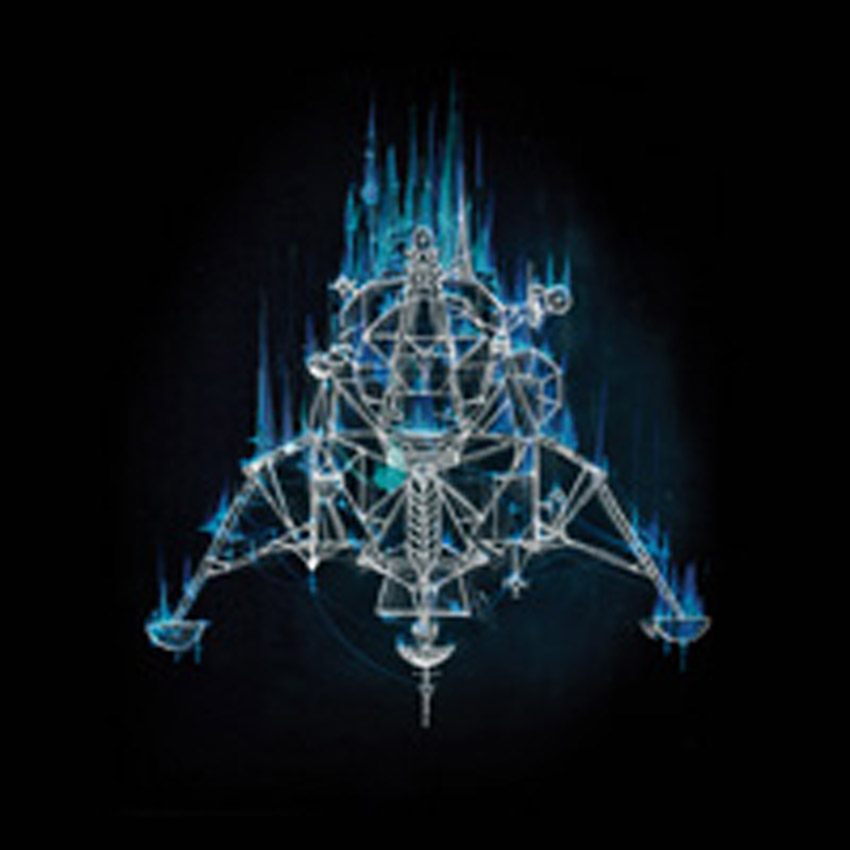Petrels, "Mima"

It has taken me entirely too long to get around to covering a Petrels album, but London composer/multimedia artist Oliver Barrett's third opus turned out to be an ideal place to start.  Due to the complex and heavily processed nature of these pieces, the closest reference point is probably someone like Tim Hecker, yet Barrett's epic scope; talent for texture, dynamics, and melody; and passion for deep and unusual concepts place both Petrels and Mima in a category all their own.
With both Talvihorros and Petrels on board, Denovali seems quite intent on becoming the go-to label for records with crazily ambitious concepts.  Case in point: Mima is partially based upon an epic and obscure (in the US, anyway) science fiction poem by Swedish Nobel Laureate Harry Martinson.  The poem in question, "Aniara," chronicles the existential struggles of colonists stranded on a spaceship that has been ejected from the solar system and has been described as "inexpressible, immeasurable sadness" that "transcends panic and terror and even despair [and] leaves you in the quiet immensities, with the feeling that you have spent time, and have been permanently tinted, by and with an impersonal larger-than-God force."  Woah.  Consequently, Mima is the sort of album that I expected to describe with phrases like "unintentionally hilarious" and "egregiously misjudged" and–in lesser hands–I am sure it would have been all that and more.  Or at least it would have just been oppressively bleak dark ambient.  In Barrett's hands, however, Mima is beautiful, sublime, and kind of staggering.
The album begins in deceptively simple and minimal fashion though, as the 15-minute "The 40 Year Mission to Titan is Overtaken by the 40 Minute Mission to Titan" opens with field recordings of crickets and a hollow metal clunk that calls to mind some hanging pots and pans in an abandoned shack being blown by a lonely wind.  The insectoid chatter gradually escalates in volume and is eventually joined by a warmly droning synth and some cymbal flourishes, but just keeps simmering until it finally gives way to a brief and somewhat unpromising interlude of stuttering, burbling synth.  And then...Mima just ERUPTS.  The last third of "The 40 Year Mission" is a densely majestic, well-earned crescendo of layers and layers of vibrantly alive synthesizer catharsis.  From that point onward, Mima is a lush, gently hallucinatory tour de force of warm chords and raw power mingled with quieter, more fragile passages fraught with mystery and accumulating tension.
Remarkably, every single one of the remaining pieces offers up at least one passage that I absolutely love.  "Katharine-22B," for example, masterfully transitions from a rapturous roar to a beautifully melancholy arpeggio melody, while the closing "Treetiger" brings the album to a roiling conclusion with a melodic wall of swirling, gnarled, and howling synthesizers or guitars that would make Kevin Shields proud (and probably little bit jealous).  Mima's pièce de résistance, however, is its third piece: "A Carapace for Carter's Snout."
Much like "The 40 Year Mission," it begins in very understated fashion, opening with some dueling feedback whines that uncomfortably wobble and oscillate together.  Gradually, Barrett allows a characteristically warm and sumptuous chord progression to fade in and gradually eclipse the initial motif.  More importantly, he also introduces a dense layer of skittering, squiggling electronics that stays for the entire song, resulting in one of my favorite musical moments of 2014 to date: the moment when all the music abruptly disappears to leave something that sounds like the ocean just spewed a squirming, chittering, slithering, and squelching mountain of deep sea life onto a beach.
The sole critique that I can muster is that Oliver's occasional drums prevent Mima from fully attaining an illusion of timelessness, as they ensure that it sounds like it came from this decade.  That "rock element" may also prevent some from seeing Barrett as a serious composer, as "Treetiger" certainly has more in common with shoegaze/post-rock than with more elitist/cerebral fare.  That is certainly not Barrett's problem though and this album certainly sounds amazing NOW.  At worst, Mima is a brilliant and ambitious album with one stone-cold masterpiece in "Carapace," but I am choosing to err on the side of calling the whole thing an unqualified triumph of both vision and execution.  Mark my words: within six months, everybody is going to be basing their albums on 60-year-old Swedish science fiction poems.
- The 40 Year Mission to Titan is Overtaken by the 40 Minute Mission to Titan
- Katharina-22B
- A Carapace for Carter's Snort
 



